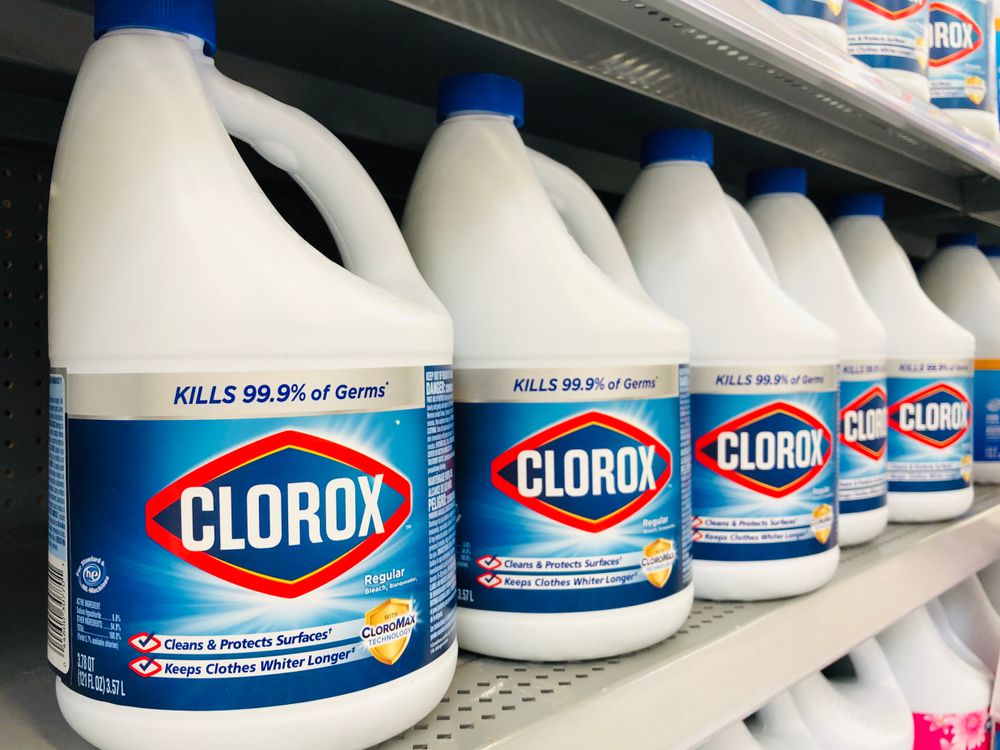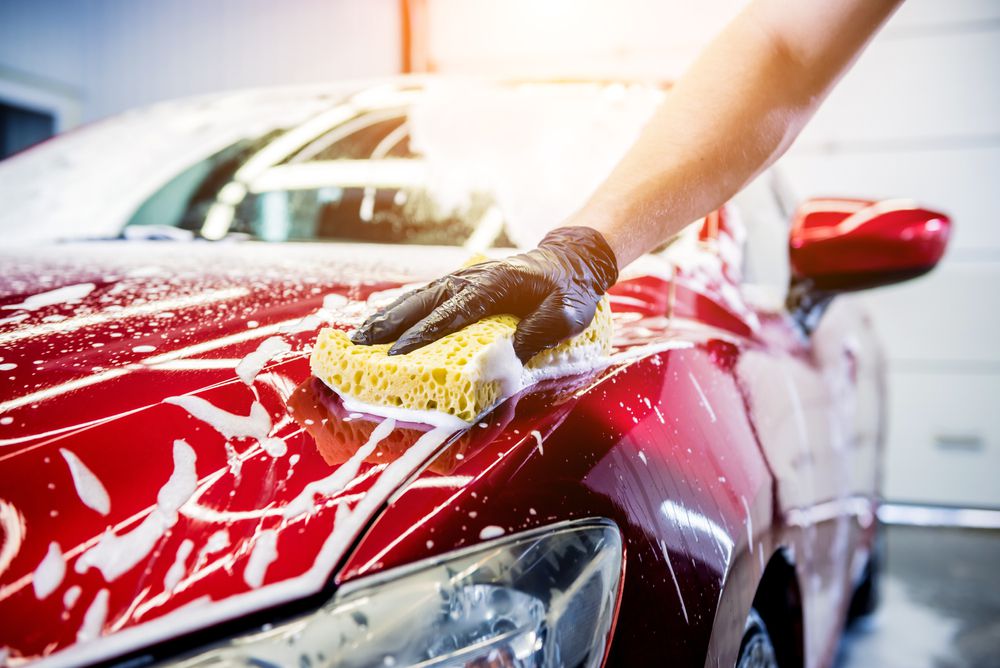A bright and shiny car is a head-turner. But maintaining its new-like
appearance is difficult because of the environmental elements. Dirt, bugs,
bird droppings, and more find their way onto your car whenever it is left
outside.
But stains like bird droppings, insect remains, and tree sap are quite
stubborn. And, the longer they stay on your car, the more challenging they
are to treat. As a result, some car owners resort to using bleach to tackle
these stubborn stains. But does bleach ruin car paint?
Yes, bleach does ruin car paint. That's why you should exercise extreme
caution; if not, refrain from using it. Bleach is a corrosive substance
that can damage your car's clear coat if left on for too long.
Besides, this hazardous chemical can irritate your skin and eyes upon
exposure.
So, what should you use for washing your car? Check out below.
 Bleach will damage automotive paint.
Bleach will damage automotive paint.
What Can I Use To Wash My Car?
You should wash your car with a dedicated car wash soap. It boasts a
gentle formula that removes the grime but keeps your paintwork shiny
and safe.
However, if you run out, you can use baby soap, hair conditioner, hand
soap, mild laundry detergent, or dish wash.
While it is a common practice, getting your car washed at an automated car
wash is terrible for your car paint. Why? Automatic car washes use massive
spinning brushes that are rarely cleaned. They rub your car with an extreme
amount of force which leaves behind tiny swirl marks on the surface of your
vehicle.
That's why the best way to wash a car is to do it yourself. Here's what you
should use:
Car Wash Soap or Shampoo
Car wash shampoos and soaps are specially formulated to be gentle on your
car's paint and finish. They are cleansing products with good lubricity
that create thick suds to lift and remove the stubborn contaminants lodged
on the surface of your vehicle. That, too, while keeping your car's paint
bright and shiny.
Baby Soap
You can also pamper your car with the soap you use to pamper your young
one. Indeed, baby soaps are an excellent alternative to any car wash
shampoo because of their light chemical makeup. They lather well and offer
good cleaning performance. In addition, baby soaps are excellent at
removing bird droppings and bug splatters.
Ensure the baby soap is free of harmful chemicals such as surfactants,
non-petroleum oil, PERC, phosphates, ammonia, and chlorine.
 Hair conditioner can be used as a car soap.
Hair conditioner can be used as a car soap.
Hair Conditioner
Hair conditioner is another excellent alternative to a dedicated car wash
soap. You can use it to eliminate the nasty buildup and gunk on your car's
inside and outside.
Some hair conditioners also contain lanolin, which gives your car a
polished finish and a decent shine.
Choose a standard, everyday hair conditioner with a neutral and natural
formulation, so it does not damage your car paint.
Laundry Detergent
Laundry detergent is a solid alternative to car soap. However, you should
know that it is quite strong and harsh. When used carelessly, laundry
detergent can peel off your car's finish, wax coat, and paint, leaving
behind scratches, cuts, and abrasions.
To solve this problem, dilute the detergent with water before spraying it
on the stain. It works well with a microfiber towel or cleaning brush for
scrubbing.
Dishwashing Liquid
Dishwashing liquid is another product that you can use as a car shampoo
substitute.
It effectively removes grease and grime, even if it has been caked on your
car for a long time. But as with laundry detergent, dish soap, with its
high chemical content, can ruin your car paint if used as is.
Diluting it with a 2:1 ratio of water helps neutralize its harshness. Even
then, you should first conduct a patch test. If it is still too strong, add
more water to dilute it.
You should never leave dish wash on your vehicle for too long. Rinse
all the residue; otherwise, it will scar and etch your car's finish.
If you still want to use bleach to clean your car, you must do so very
carefully. Learn how below.
Can You Clean a Car With Bleach?
Yes, you can clean a car with bleach. It is especially useful for
treating stubborn chemical stains. But you should avoid using it
because it is very harsh.
Bleach can strip your car's finish if you leave it on for too long, and
we are not talking about hours; it can ruin your car paint within
minutes.
From toilets to clothes and different surfaces, bleach is used to clean
many things. For example, it can be a suitable cleaning agent for washing
your car. However, you should always exercise caution, especially in its
undiluted form.
If you want to safely use bleach for cleaning your car, you should first
correctly dissolve it in water. Now use a microfiber towel to apply the
bleached water to your vehicle. Finally, rinse off quickly and thoroughly.
Using undiluted bleach can quickly lead to oxidation and other damage.
Never mix bleach with other cleaners or detergents.
What Would Bleach Do to a Car?
Bleach will ruin the paint and trim of a car if left on its surface for
too long by peeling away the clear coat of the car paint and causing
staining on the rubber and metal trim of a car.
Bleach can also strip the wax from the car's surface, leading to
fading.
Leaving the bleach to dry or not rinsing it off properly can cause damage
to your car's paint and finish. Because of its corrosive nature and
chemical content, bleach can quickly degrade the luster and shine of your
vehicle. Here is what it would do to a car:
Damages The Paint And Trim
Bleach is a hardcore oxidizer. If there are scuffs and scratches already
present on your car, it can cause rust and pit the exposed metal.
It also threatens your car's clear coat if left on it for long. Bleach will
wear away the clear coat, exposing the paint to UV damage and fading.
Bleach can also damage the rubber and metal trims. It can weaken the rubber
trim and corrode the metal ones.
Causes Staining
Bleach ruins car paint by causing staining on your paint and rubber trim.
If you leave it to dry or don't thoroughly rinse it off, the bleach
solution can stain the car paint.
Strips The Wax
Wax is important for your car because it protects the clear coat.
Unfortunately, another damaging effect of bleach on a vehicle is that
bleach strips the wax.
Because of its alkaline nature, bleach degrades the wax, leaving it
unprotected. This accelerates the speed at which the car paint dulls and
fades.
How Long Does It Take Bleach To Ruin Car Paint?
Bleach can ruin car paint in as little as a few minutes. Undiluted bleach can
start reacting with your car if left on its surface for more than a
minute. The diluted bleach solution can sit on a car for up to three
minutes, after which it starts to ruin car paint.
This chemical substance can trigger paint oxidation if it sits on the
surface of a car for too long. When we say "too long," it doesn't mean
hours.
Undiluted bleach starts oxidizing immediately and can ruin car paint if it
sits on it for more than sixty seconds. In comparison, three minutes is too
long for diluted bleach. This is because it becomes less reactive when you
mix bleach with water.
Does Bleach Dissolve Rubber?
No, bleach does not dissolve rubber. But its overuse can make it weak
until it begins to deteriorate.
Like metal, rubber also forms some important parts of your car. Namely
wheels, trim, the underside of the floor mats, etc. Cleaning these is also
a part of cleaning the car.
If you plan to clean these using bleach, do so occasionally. Overusing
bleach on rubber surfaces can cause it to lose elasticity, crack, or
degrade.
How Do You Remove Chemical Stains From Car Paint?
Chemical stains like bird droppings, chippings, fluid stains, and tree sap can be
removed using different combinations of distilled water, vinegar, and
baking soda with your car shampoo. Some of these treatments must be
done in the shade, away from sunlight.
Chemical stains appear on car paint due to chemical reactions. They do not
come off with car soap and water and must be treated with specific
compounds for removal.
Below we discuss how you can remove the most common ones.
Fluid Stains
Fluid stains happen when you accidentally spill fluids like cleaning
liquids, wax, brake fluid, and polish. The acidic ingredients in these
fluids react with your car's paint, marring it.
To treat such stains, mix some vinegar with the car wash soap and use this
mixture to clean the stains.
Tree Sap
Tree sap is very acidic. It can fall on your car when parked unprotected
under a tree and leave behind a stubborn chemical stain if allowed to dry.
Since prevention is better than cure, you should avoid parking your car
under the trees to protect it from tree sap. But if your car has sap
stains, you can remove them using a mixture of distilled water and vinegar.
You can also follow this mixture with a reliable car wash product to
restore shine.
Bird Droppings
Bird droppings are also acidic in nature. So if you don't clean them
immediately, they can leave behind a stubborn stain on the car paint.
Moreover, if you leave them for a long time, they can eat up your car's
paint right down to the primer.
The chemical stains caused by bird droppings are easily washed away with
baking soda and warm water or vinegar and distilled water.
Conclusion
Bleach can damage car paint if you leave it on for a few minutes. That's
why you should avoid using it for cleaning your car in the first place.
However, if a certain stubborn stain forces you to use bleach, always
dilute it beforehand and exercise extreme caution while using it.
Always spray the bleach solution on the stain rather than pour it on. And
rinse it out thoroughly to avoid damage.
Alternatively, you can also use an excellent pre-packaged car washing
product or make a DIY car cleaning solution to wash your car and restore
its shine.